
This year I am reading through the Bible, chronologically, fulfilling a long-time desire. Using a read through the Bible chronologically makes it much easier to do – reading for the day is altogether no matter where it is found in our Bibles!
It has been good to do this because as I become familiar with passages of Scripture, I sometimes find myself reading words – not thinking about anything I am reading – just completing the assignment for the day! Changing how I do things helps me be alert and pay closer attention to what I am reading.
The other day I was reading Exodus 13, where the children of Israel are in the wilderness on their way to the Promised Land. They are approaching the Red Sea after their release from slavery – 400 years of bondage to the Egyptian monarchy. For a moment, stop and consider what that must have been like for them. So many generations before them were born as enslaved people and died as enslaved people! But now they are free – freed by their God Jehovah!

As they begin their journey to the Promised Land, they are told repeatedly to remember this day – to remember how they were delivered from the enemy: “ by the strength of the LORD’S hand.” God gives them a little information about where they are headed – a land of the Canaanites, Hittites, Amorites, Hivites, and the Jebusites, a land promised to their fathers flowing with milk and honey. Notice the contrast: a flourishing land that will meet their physical needs, but also a land full of their enemies!
God continues to tell His children that He will be with them – day and night. They will know that He is Present in the pillar of cloud by day

and at night when the cloud would have the appearance of fire.  They can see His Presence at all times. He also tells them that He will fight the upcoming battle at the Red Sea for them; they, however, were to stand still and hold their peace as they stood on the banks of the Red Sea,
They can see His Presence at all times. He also tells them that He will fight the upcoming battle at the Red Sea for them; they, however, were to stand still and hold their peace as they stood on the banks of the Red Sea,
 There is disagreement about where the children of Israel crossed, so it is impossible to determine the depth and width at the crossing. But what can we learn from Scripture? The following information is from an article from whatsaiththeScriptures.org.
There is disagreement about where the children of Israel crossed, so it is impossible to determine the depth and width at the crossing. But what can we learn from Scripture? The following information is from an article from whatsaiththeScriptures.org.
When the Jews left Egypt after Passover and during Unleavened Bread, it was nighttime. God told Israel that He would kill Egypt’s firstborn at “midnight” (Exodus 12:29). In the night, Pharaoh tells Moses and Aaron, shortly after the firstborn were slain, that Israel should leave Egypt (verse 31). And on that very same day, the Lord brought the sons of Israel out of the land of Egypt according to their multitudes (verse 51).
Exodus 14:24 tells us that by “the morning watch” (“the last portion of the night”), the Egyptian armies are still trying to reach the Red Sea and attack Israel. By the “morning,” the sea had returned to its normal state and covered the Egyptian armies. The waters went back instantly as God held them back. God’s miracles occur in an instant. (Matthew 8:3; Mark 1:32; Mark 10:52; Luke 4:39; Luke 18:43; John 5:9; Acts 9:18), Evidently, it took several hours for all Jews to cross the Red Sea. During this period of hours, God sustained the walls of water.
 We do not know how many Jews walked side-by-side across the Red Sea, but we can conclude that the Red Sea’s opening and closing happened within the time of one night and thus not days. Exodus 12:29 (“midnight,” Israel told to leave Egypt) and Exodus 14:27 (“morning appeared,” the Red Sea covered the Egyptians) would give us an estimation of fewer than six hours for the Jews to enter the Red Sea and safely pass through to the other shore.
We do not know how many Jews walked side-by-side across the Red Sea, but we can conclude that the Red Sea’s opening and closing happened within the time of one night and thus not days. Exodus 12:29 (“midnight,” Israel told to leave Egypt) and Exodus 14:27 (“morning appeared,” the Red Sea covered the Egyptians) would give us an estimation of fewer than six hours for the Jews to enter the Red Sea and safely pass through to the other shore.
 Put yourself in the sandals of the Israelites ….
Put yourself in the sandals of the Israelites ….
What had they experienced, what did they know, and what was promised them?
- They were free from the cruelty of slavery – no longer in prison.
- They were released by the Lord – the strength of His hand and instructed not to forget!
- They were going to the Promised Land – a land that Abraham, Isaac, and Jacob had been promised as a possession. But this land was not one they were familiar with – none of them had traveled there before. None of them had ever been free to travel anywhere!
- This land flourished with meat and produce but was also occupied by other nations – God’s enemies.
- They were told that they could see the Presence of Jehovah – He would always be there with them – all they had to do was look up.
- God did not lead them the shortest route to the Promised Land; instead, He took them into the wilderness of the Red Sea. I wonder how many of them were familiar with the Red Sea. And why did God do this? “Lest perhaps the people change their minds when they see war and return to Egypt.” They were in an army, God’s army. But they were not trained as soldiers; they were trained as slaves!
- When they arrived at the Red Sea, they were “not to be afraid; they were to stand still and see the salvation of the LORD which He will accomplish for you today. For the Egyptians whom you see today, you shall see again no more forever. The LORD will fight for you, and you shall hold your peace.”
I don’t know about you, but I am afraid that I would have been one of those Israelites that would have questioned Moses and the LORD.

“I am free but going to a land filled with other cruel nations like I just left. I have to travel through the wilderness rather than take the short route to this enemy-filled land. And what about the Red Sea?  I have to cross it as the Egyptians are coming after me to kill me. But I don’t swim! HELP! How can I escape certain death – water before me and Egyptians behind me.”
I have to cross it as the Egyptians are coming after me to kill me. But I don’t swim! HELP! How can I escape certain death – water before me and Egyptians behind me.”

As I continued to read, I thought about how this situation for Israel is no different from what you and I face every day.
We have been freed from the cruelty of slavery – no longer in prison. We know that our old self [our human nature without the Holy Spirit] was nailed to the cross with Him so that our body of sin might be done away with so that we would no longer be slaves to sin. For the person who has died with Christ has been freed from the power of sin. (Romans 6: 6-7)

We have been released by the strength of His hand: For the death that He died, He died to sin, ending its power and paying the sinner’s debt once and for all. The life that He lives, He lives to glorify God in unbroken fellowship with Him. Even so, consider yourselves to be dead to sin and your relationship to it broken, but alive to God in unbroken fellowship with Him in Christ Jesus. For sin will no longer be a master over you, since you are not under Law as enslaved people, but under unmerited grace as recipients of God’s favor and mercy. (Romans 6: 10-11, 14)

We are on our way to the Promised Land – heaven. But for now, we live in a land that God’s enemies occupy. But this land is not one we are familiar with – we have not traveled here before. But we are different because our citizenship is in heaven. Therefore, we do not lose heart … for our momentary, light affliction is producing for us an eternal weight of glory far beyond all comparison, while we look not at the things which are seen, but at the things which are not seen; for the things which are seen are temporal, but the things which are not seen are eternal. I have told you these things so that in Me you may have perfect peace. You will have tribulation and distress and suffering in the world, but be courageous, confident, undaunted, and filled with joy; I have overcome the world. My conquest is accomplished My victory abiding. (Philippians 3:20; 2 Corinthians 4: 16-17; John 16:33)

God is always with us on our daily faith journey. He has said, “I will never under any circumstances, desert you nor give you up nor leave you without support, nor will I in any degree leave you helpless, nor will I forsake or let you down or relax My hold on you – assuredly not!” Be strong and courageous, do not be afraid or in dread of them, for the Lord your God is the One who is going with you. He will not desert you or abandon you. And the Lord is the one who is going ahead of you; He will be with you. He will not desert you or abandon you. Do not fear, and do not be dismayed.” (Hebrews 13:5; Deuteronomy 31: 6,8)
We are in God’s army. He may not take us the shortest route over our mountain, but we can know He will enable us if we must climb up cliffs.
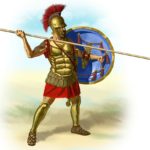 Share in suffering as a good soldier of Christ Jesus. No soldier gets entangled in civilian pursuits since his aim is to please the one who enlisted him. Put on the whole armor of God, that you may be able to stand against the schemes of the devil. (2 Timothy 2: 3-4; Ephesians 6:1)
Share in suffering as a good soldier of Christ Jesus. No soldier gets entangled in civilian pursuits since his aim is to please the one who enlisted him. Put on the whole armor of God, that you may be able to stand against the schemes of the devil. (2 Timothy 2: 3-4; Ephesians 6:1)
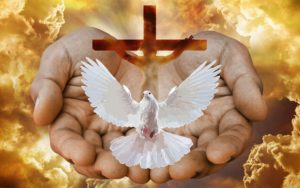 I will ask the Father, and He will give you another Helper, a Comforter, Advocate, Intercessor, Counselor, Strengthener, Standby, to be with you forever. I will not leave you as orphans comfortless, bereaved, and helpless; I will come back to you. (John 14:16, 18)
I will ask the Father, and He will give you another Helper, a Comforter, Advocate, Intercessor, Counselor, Strengthener, Standby, to be with you forever. I will not leave you as orphans comfortless, bereaved, and helpless; I will come back to you. (John 14:16, 18)
Do not be afraid when we stand at the edge of our Red Sea. Stand still in the peace of God and watch what the Lord does for you by destroying the enemy. The Lord is a warrior; the Lord is His name. Do not fear them, for the Lord your God is the One fighting for you. The Lord will fight for you while you only need to keep silent and remain calm. (Exodus 15:3; Deuteronomy 3:22; Exodus 14:14) Then he said to me, … “‘Not by might, nor by power, but by My Spirit,’ says the Lord of hosts. (Zechariah 4:6)
It is up to us whether we believe these verses and walk in the light of these verses. My focus this year is learning to practice the Presence of the Lord, being conscious of His Presence throughout my day. And how do I do this?
Our Sovereign Lord is always doing a new thing. I pray that He will open the eyes of our minds and hearts so that we can see the many possibilities He has placed along our path. Protect us from following into such a routine way of living that we see only the same old things – missing the newness of Him. He always makes a way when there appears to be no way because all things are possible with Him. (Matthew 19:26)
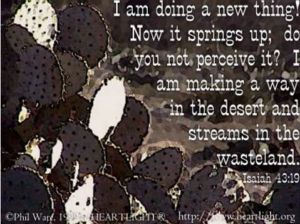
He has deposited a treasure within in me, within each one of His children – His very nature. We belong to God (2 Timothy 2:14; 1 Corinthians 3:16; 6:196). We are more precious than outer space and all the galleries in the heavens above including all the angels and the seraphim (Psalm 139: 13-16; John 3:16). We are the apple of His eye (Deuteronomy 32:10; Psalm 17:8; Zechariah 2:8). I want to know Him in the power of His resurrection and the fellowship of His suffering and be made conformable unto His death (Philippians 3:10). I want to know and see the beauty and the wonder that is Him (Psalm 27:4; Isaiah 33:17).
When I focus in anticipation about what lies ahead of me, I am prone to rehearse my troubles repeatedly in my mind causing me to experience painful problems many times. The difficulties that God only intends for me to undergo once – when they actually happen. Only as I walk in His Presence, I stop multiplying my suffering in this way.
God has given me freedom, the freedom to choose my focus. As I consciously walk in His Presence, I am strengthened and prepared for my day. I am enabled to transform my fear into confident trust. I can stop my mind from wandering and come back into His Presence. My anxious thoughts shrink and fade away in His Light. His unconditional Love unmasks judgmental thoughts. Confused thoughts are untangled while I rest in the simplicity of His Peace.





 What was David’s battle plan?
What was David’s battle plan?
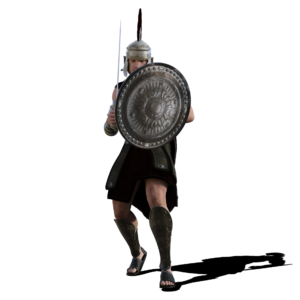
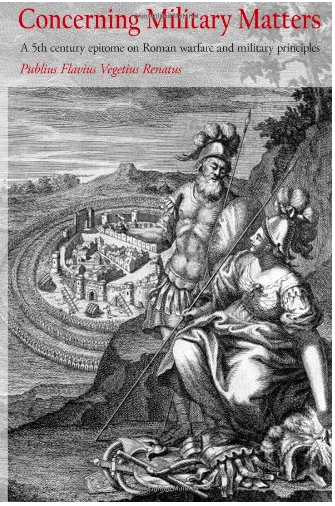 Concerning military training, Flavius Vegetius Renatus wrote in his book Concerning Military Manners (late 4th Century AD), “We find that the Romans owed the conquest of the world to no other cause than continual military training, exact observance of discipline in the camps, and unwearied cultivation of other arts of war. They thoroughly understood the importance of hardening their recruits by continual practice and training them to every maneuver in line and action. Nor were they less strict in punishing idleness and slothfulness.” You may be thinking that a great deal was expected of their soldiers, and you are correct…. this is precisely the point! The commanders’ high expectations and intense training of their troops laid the foundation for future victory.
Concerning military training, Flavius Vegetius Renatus wrote in his book Concerning Military Manners (late 4th Century AD), “We find that the Romans owed the conquest of the world to no other cause than continual military training, exact observance of discipline in the camps, and unwearied cultivation of other arts of war. They thoroughly understood the importance of hardening their recruits by continual practice and training them to every maneuver in line and action. Nor were they less strict in punishing idleness and slothfulness.” You may be thinking that a great deal was expected of their soldiers, and you are correct…. this is precisely the point! The commanders’ high expectations and intense training of their troops laid the foundation for future victory.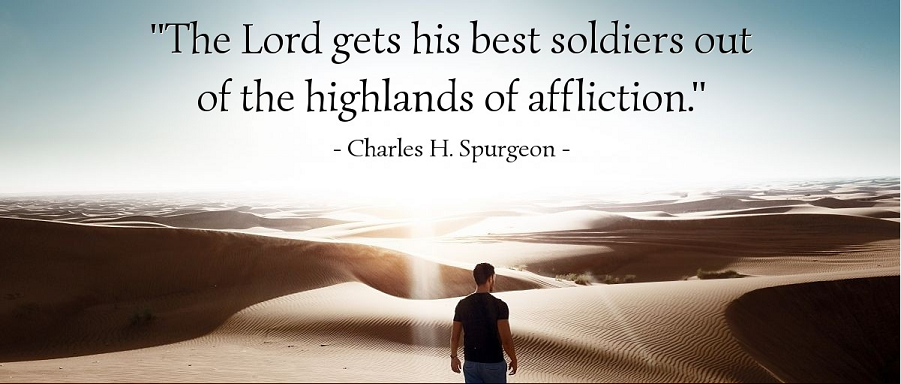

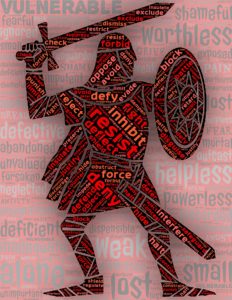 If you want to walk in the whole armor of God and function effectively on the battlefield, you must be spiritually fit.
If you want to walk in the whole armor of God and function effectively on the battlefield, you must be spiritually fit. We can silence those voices we hear in our head; those voices that want to control us by taking the easy way out – to submit to them.
We can silence those voices we hear in our head; those voices that want to control us by taking the easy way out – to submit to them.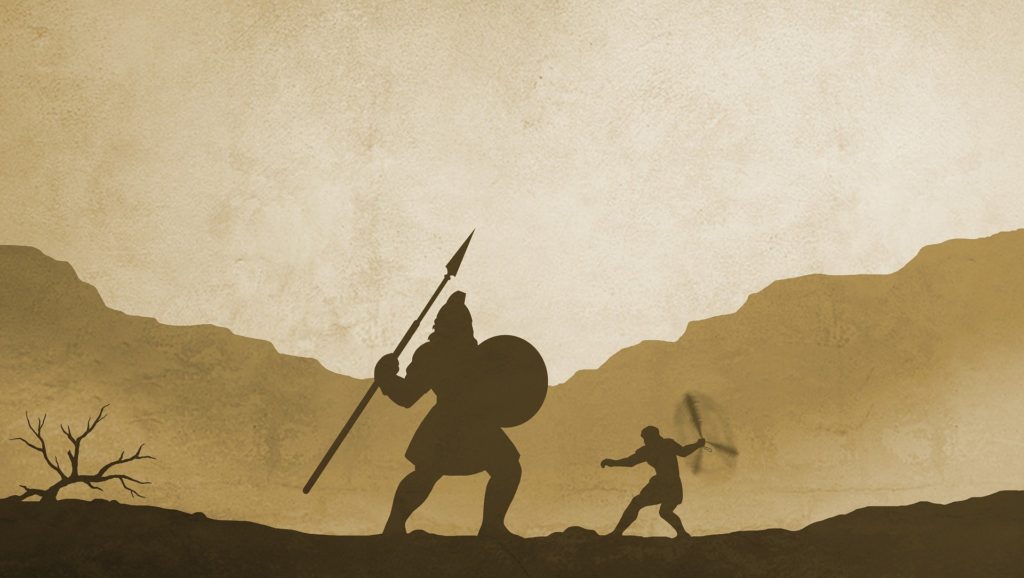
 For me, I envision myself crossing the finish line wearing garments of praise.
For me, I envision myself crossing the finish line wearing garments of praise. 



 These thought patterns can affect our feelings and how we respond to various situations in life, and they play a significant role in our spiritual freedom.
These thought patterns can affect our feelings and how we respond to various situations in life, and they play a significant role in our spiritual freedom.
 resulting in strongholds we establish in our minds for our protection.
resulting in strongholds we establish in our minds for our protection. At the root of many fortresses is a desire to want to prove our worth and our value, or in many cases, not feeling like we are worthy of love, affirmation, or success.
At the root of many fortresses is a desire to want to prove our worth and our value, or in many cases, not feeling like we are worthy of love, affirmation, or success.
 a wall of lies, mistaken ideas about the person of God, flawed interpretations of Scripture, prideful thoughts, and distorted perceptions of how God sees us and feels about us, especially when we sin or stumble.
a wall of lies, mistaken ideas about the person of God, flawed interpretations of Scripture, prideful thoughts, and distorted perceptions of how God sees us and feels about us, especially when we sin or stumble. Our arch-enemy whispers thoughts in our minds that no one can be trusted. We believe the lie and decide that we are on our own. We then become highly independent, trusting no one, including God and His promises which are sure and steadfast!
Our arch-enemy whispers thoughts in our minds that no one can be trusted. We believe the lie and decide that we are on our own. We then become highly independent, trusting no one, including God and His promises which are sure and steadfast!
 When we buy into these lies and agree with the enemy, surrendering control, that area of our life becomes a stronghold, which the enemy vigorously defends and retains power. The negative words and thoughts control our thinking processes, our perception of others, and situations. We have now formed an imagination, a false idea that we believe to be true, but in reality, it is not. These imaginations, or false beliefs, will ultimately lead to actions.
When we buy into these lies and agree with the enemy, surrendering control, that area of our life becomes a stronghold, which the enemy vigorously defends and retains power. The negative words and thoughts control our thinking processes, our perception of others, and situations. We have now formed an imagination, a false idea that we believe to be true, but in reality, it is not. These imaginations, or false beliefs, will ultimately lead to actions. We find ourselves struggling to live the victorious and abundant life that God has for us.
We find ourselves struggling to live the victorious and abundant life that God has for us.
 .
.


 With my last tearful episode, I found myself pondering this truth a little deeper. My mind was taken to Romans 8 and the depth of God’s love. Romans 8:38-39 For I am convinced and continue to be confident—beyond any doubt that neither death, nor life, nor angels, nor principalities, nor things present and threatening, nor things to come, nor powers, nor height, nor depth, nor any other created thing, will be able to separate us from the unlimited love of God, which is in Christ Jesus our Lord.
With my last tearful episode, I found myself pondering this truth a little deeper. My mind was taken to Romans 8 and the depth of God’s love. Romans 8:38-39 For I am convinced and continue to be confident—beyond any doubt that neither death, nor life, nor angels, nor principalities, nor things present and threatening, nor things to come, nor powers, nor height, nor depth, nor any other created thing, will be able to separate us from the unlimited love of God, which is in Christ Jesus our Lord. Then I was reminded of the value God places on the sparrows, the hairs on our heads.
Then I was reminded of the value God places on the sparrows, the hairs on our heads. Listen: Matthew 10: 29-31 Are not two little sparrows sold for a copper coin? And yet not one of them falls to the ground apart from your Father’s will.
Listen: Matthew 10: 29-31 Are not two little sparrows sold for a copper coin? And yet not one of them falls to the ground apart from your Father’s will.  for the Father is sovereign and has complete knowledge. So do not fear; you are more valuable than many sparrows.
for the Father is sovereign and has complete knowledge. So do not fear; you are more valuable than many sparrows.

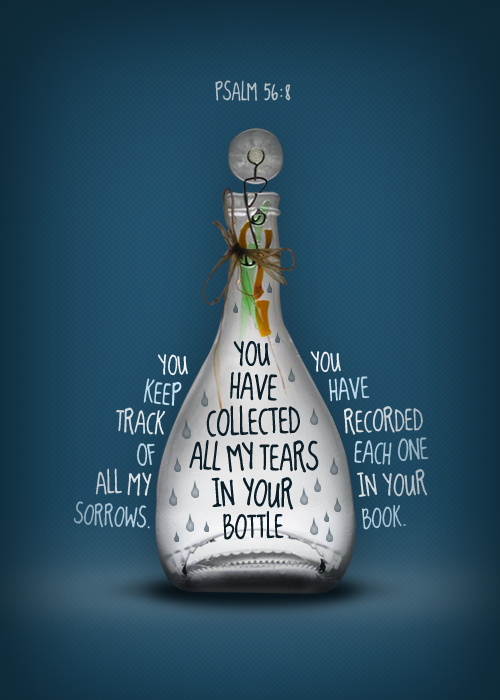


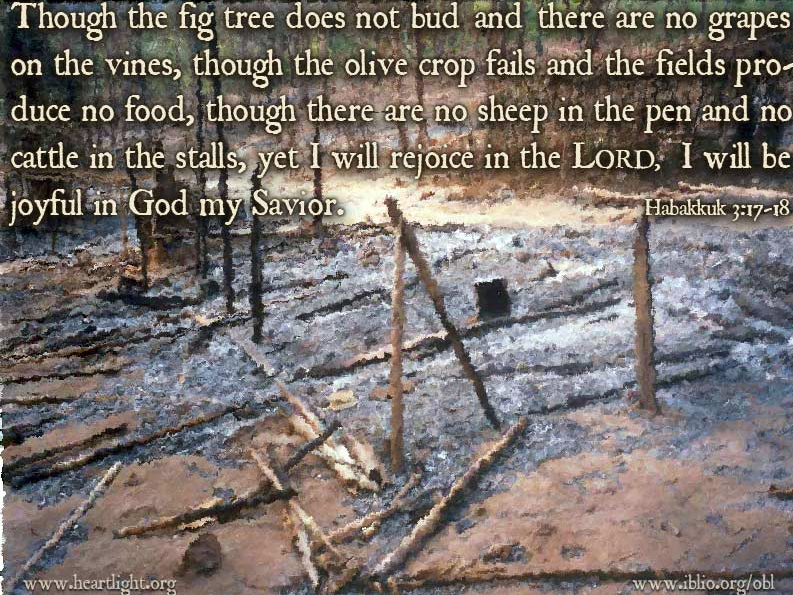


 The olive trees have not produced olives,
The olive trees have not produced olives,




 What are you facing? What sudden and unexpected calamity has come your way? Where do you turn? What do you say to yourself? I have come to believe that the most important words we speak are the words that we speak to ourselves.
What are you facing? What sudden and unexpected calamity has come your way? Where do you turn? What do you say to yourself? I have come to believe that the most important words we speak are the words that we speak to ourselves.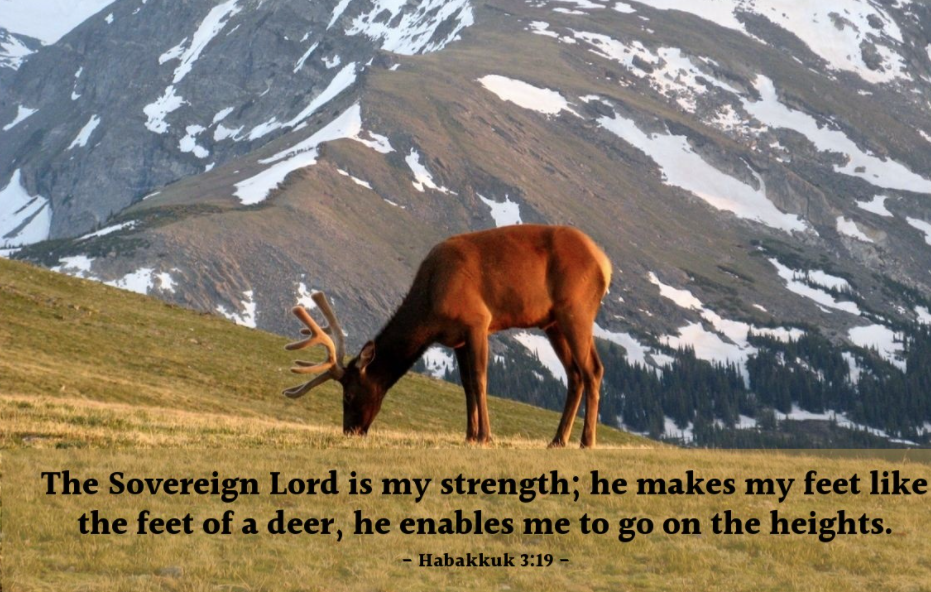
 We are likely familiar with these Scripture passages “perfect love casts out all fear” (1 John 4:18). Or “the fear of God is the beginning of wisdom” (Proverbs 1:7, 9:10). You have possibly heard many messages, maybe even read books about what it means to fear God. It is said that there are at least 360 verses in the Word of God that command us “do not fear.”
We are likely familiar with these Scripture passages “perfect love casts out all fear” (1 John 4:18). Or “the fear of God is the beginning of wisdom” (Proverbs 1:7, 9:10). You have possibly heard many messages, maybe even read books about what it means to fear God. It is said that there are at least 360 verses in the Word of God that command us “do not fear.”


 God never speaks to you or me without purpose and meaning. He is in the business of transforming our lives into the character of His Son. Hearing His heartbeat and footsteps are always fueled by His love, which transforms you and me and ignites a new passion. We now begin to discover the power and the force of His love in the purest form.
God never speaks to you or me without purpose and meaning. He is in the business of transforming our lives into the character of His Son. Hearing His heartbeat and footsteps are always fueled by His love, which transforms you and me and ignites a new passion. We now begin to discover the power and the force of His love in the purest form.


 She has prepared for this moment for 13 years, and now she will experience her dreams of becoming a secondary teacher majoring in art education!
She has prepared for this moment for 13 years, and now she will experience her dreams of becoming a secondary teacher majoring in art education!



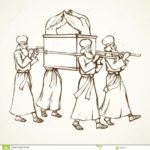

 Do not miss the point: God has not remained silent.
Do not miss the point: God has not remained silent. 











 But what happens when we make a mistake?
But what happens when we make a mistake? 


 The Word instructs us to center our thoughts or focus on those confirmed by His Word; those that are true, honorable, right, pure, wholesome, lovely, and bring peace. Think continually about things that are worthy of praise and plant them in your heart.
The Word instructs us to center our thoughts or focus on those confirmed by His Word; those that are true, honorable, right, pure, wholesome, lovely, and bring peace. Think continually about things that are worthy of praise and plant them in your heart.


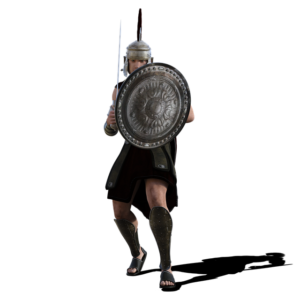 Note what Jonathan’s armor-bearer replied in 1 Samuel 14:7 when he was invited to join Jonathan in fighting the Philistines; his response was, “do everything that is in your heart. Here I am with you in whatever you think best.” His armor-bearer completely trusted Jonathan’s decision, and he willingly followed him into battle at the risk of his own life.
Note what Jonathan’s armor-bearer replied in 1 Samuel 14:7 when he was invited to join Jonathan in fighting the Philistines; his response was, “do everything that is in your heart. Here I am with you in whatever you think best.” His armor-bearer completely trusted Jonathan’s decision, and he willingly followed him into battle at the risk of his own life.









 Yes, Jonathan and his armor-bearer were victorious. The Philistines were defeated while his father, the king, 600 soldiers, and the Lord’s priest, Ahijah, were sleeping under the pomegranate tree.
Yes, Jonathan and his armor-bearer were victorious. The Philistines were defeated while his father, the king, 600 soldiers, and the Lord’s priest, Ahijah, were sleeping under the pomegranate tree.
 Jonathan did not sit on the sidelines and wait for success to happen. No, he made a decision – to move with God. Johnathan seized the moment, realizing its urgency. He moved with the heart of God, the character of God.
Jonathan did not sit on the sidelines and wait for success to happen. No, he made a decision – to move with God. Johnathan seized the moment, realizing its urgency. He moved with the heart of God, the character of God.



